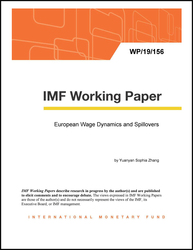
European Wage Dynamics and Spillovers
Wage rises have remained stubbornly low in advanced Europe in recent years, but, at the same time, newer EU members are experiencing rapid wage acceleration. This paper investigates the drivers of this wage divergence. Econometric analysis using error correction models suggests that wage growth responds more quickly to changes in unemployment in the newer EU members than in advanced Europe, where wages are more closely related to inflation and inflation expectations in the short run, implying greater inertia in nominal wage rises in advanced Europe. In the years after the global crisis, this inertia contributed to the build up of a real wage overhang relative to sharply slowing labor productivity, which subsequently dragged on nominal wage rises even as unemployment began to decline. Spillovers of subdued wage growth between euro area countries also weighed on wage rises in advanced Europe.
Publication date: July 2019
ISBN: 9781498319294
$18.00
Add to Cart by clicking price of the language and format you'd like to purchase
Available Languages and Formats
| English |
Prices in red indicate formats that are not yet available but are forthcoming.
Topics covered in this book
This title contains information about the following subjects.
Click on a subject if you would like to see other titles with the same subjects.
wages , spillovers , Phillips curve , non-employment , European Union , wage growth , inflation expectation , Eu member , real wage , euro area
Summary
Copyright © 2010 - 2026
Powered by:
AIDC



